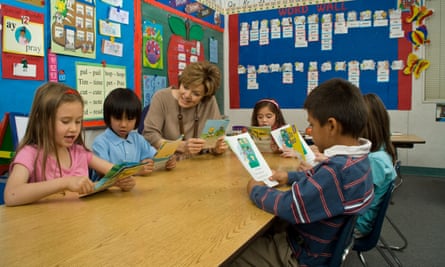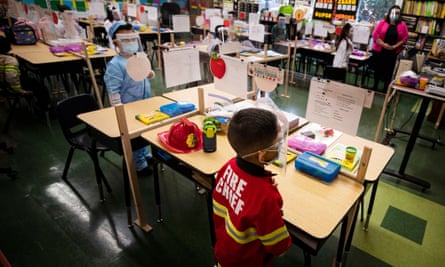When his son was born seven weeks early, weighing only 2.5lbs, RH watched as the little boy stayed in the neonatal intensive care unit for 37 days.
When they finally left the hospital, RH, who asked to use his initials for health privacy, breathed a sigh of relief. The baby, despite his difficult start, was perfectly healthy. But only a few months later, the child landed back in the hospital with a dangerous virus, RSV.
“It’s terrifying,” he said. His tiny son was hooked up to a maze of wires and beeping monitors, including oxygen to help with his breathing and intravenous fluids for dehydration. He stayed there for a week.
Hospitalizations for respiratory viruses like RSV, influenza, and others are surging across the United States, with children under five – especially newborns and premature babies – at the most risk, while simultaneous shortages of antivirals and antibiotics have swept the nation.
RSV hospitalization rates for newborns are seven times higher than they were in 2018, the last full season before the pandemic struck, and flu hospitalizations are the worst they’ve been in a decade. Rhinovirus, enterovirus, adenovirus, metapneumovirus and parainfluenza are also contributing to this wave of illness, and Covid cases are beginning to rise once again in the US.
More than three-quarters of pediatric hospital beds were already full by mid-November. One hospital in Oregon has instituted pediatric crisis of care standards, an emergency measure to stretch existing capacity. Hospitals in California and Maryland began using overflow tents to try to address the swell in pediatric patients. Children’s hospitals in Boston and Salt Lake City have canceled planned surgeries.
At least three children have died from RSV and 12 children have died from the flu so far this year, according to the US Centers for Disease Control and Prevention (CDC).
Leading child health organizations are calling for the Biden administration to declare a national emergency, as some 55 million Americans return from Thanksgiving holiday travel and many prepare for Christmas and New Year celebrations.
“I think it should have been called a national emergency a month ago,” said Anita K Patel, a pediatric critical care specialist at Children’s National in Washington, DC, and an assistant professor of pediatrics at George Washington School of Medicine and Health Sciences.
Children’s National has been operating at or near capacity for the past two months amid an “enormous spike” in RSV and flu cases, as well as other viruses, she said.
“It’s like a viral petri dish right now,” said Mark Kline, physician-in-chief and chief medical officer at Children’s Hospital, New Orleans. He’s seen a “deluge” of children needing hospitalization for viral respiratory diseases over the past four to six weeks.
The curves for new cases and hospitalizations are “almost vertical”, Kline said. “You’re at wintertime peak levels in the first half of November.” His hospital system is seeing double the number of patients usually seen at this time of year, and the flu positivity rates, for instance, have been “extremely high” at 30 to 35%.
Respiratory viruses like flu and RSV typically spike in the winter – but not this early, often not simultaneously, and not at this scale. “What’s unique about this year is the sheer volume of cases,” Patel said.
Another challenge has been the number of different viruses circulating at once. “Any one of them individually would have strained the system, but we’re dealing with at least four simultaneously,” Kline said. Pediatricians and primary care practices are also swamped.
The child health crisis has had ripple effects across American society. Some schools have closed or temporarily switched to virtual learning as staff and students fall ill. And the surge in even mild illness has taken a toll on parents. In October, more than 100,000 people missed work because of child care issues – a greater number than any other point in recent years, including 2020.
RH’s son caught Covid in August, and his pediatrician warned that he might get sicker than usual in the next few weeks as he recovered. A friend had also warned him that RSV hits newborns and premature babies especially hard. When the baby came down with the sniffles a few weeks later, RH and his wife kept a close eye on him. After a few days, he seemed to be getting sicker, more lethargic. Then he vomited, and his breaths were labored.
“It’s just that spidey sense you get where you’re like, something’s wrong,” RH said.
His worries were confirmed. After a few hours of waiting in the emergency department, the medical team agreed that it looked like the baby was suffering from a severe case of RSV and should be admitted for care. That hospital was full of pediatric patients, though. They had to be transferred by ambulance to another hospital about 45min away from their home.
“It turned out to be the last bed that they had,” RH said. He felt lucky that he’d listened to his instincts, and that he hadn’t waited.
The causes for this wave in illness are complex and still being understood.

One term, “immunity debt,” has arisen during the pandemic, but it’s not a scientific or medical term, and definitions can be confusing.
Some proposed that precautions from Covid would lead to weakened immune systems for children – similar to the hygiene hypothesis, or the discredited idea that getting sick is good for the immune system. The idea that taking precautions weakens the immune system is a “total junk hypothesis”, Patel said.
Another interpretation is that Covid itself has weakened immune systems, making other infections more severe. But there is no indication of permanent damage to immune systems, as there can be with viruses like HIV. “I haven’t seen any evidence of that,” Kline said.
Several viral infections, including measles, are capable of temporarily suppressing immune responses, and more research on possible complications after Covid need to be done, experts said. Some immunological dysfunction may persist for months after mild or moderate Covid infections, one study found. Another recent study found that babies seemed to have worse bouts with RSV soon after a Covid infection.
“We see that Covid affects every single organ system in your body,” Patel said. “Most kids at this point have had Covid, so that could have, unfortunately, also weakened their immune systems. But it’s too early to tell.”
It’s also possible that a more severe variant of RSV is circulating in some communities.
But it could just be the vast numbers of infections causing the strain.
The pediatric surge has been compared to the March 2020 Covid crisis that threatened to incapacitate hospitals. And it’s happening on top of an existing healthcare crisis, with years of health worker shortages, illnesses and burnout.
Yet some of these dangerous viruses are preventable by vaccination, and all of them could be dampened by measures like improving air quality and wearing masks.

The International Epidemiological Association called last week for global child vaccinations against Covid-19 amid staggeringly low vaccine rates for kids. The flu vaccine has also had low uptake.
While there is no vaccine for RSV, there are monoclonal antibodies that are extremely effective at preventing hospitalization from RSV for at-risk infants, including premature babies – but many parents still don’t know about it, and getting approval from insurance companies can take time.
The children most vulnerable to the worst outcomes are also too young to get vaccinated against the flu and Covid, and they’re too young to wear masks.
That means other precautions need to be taken as well by everyone around them.
Masks, for instance, have proven very effective at preventing respiratory viruses. “Masks will help prevent transmission of these other respiratory viruses the same way that masks prevent transmission of Covid-19,” Kline said.
Schools and daycare centers should also invest in better ventilation and air filtration to remove many pathogens – including respiratory viruses and allergens – from the air, he said.
And staying home when you’re sick is one of the most effective ways to cut down on further transmission. Even illnesses that seem mild in older kids and adults can be devastating for young children.
“If your child is sick, please don’t send them to school, please don’t take them to family gatherings,” Kline said. “Keep them home.”
After a week in the hospital, RH’s son had dramatically improved, though he still had a lingering cough a few weeks later. He’s already been vaccinated against the flu, and next he’s getting his Covid vaccine.
RH is now on a mission to let other parents know about how dangerous these viruses can be for children. He took a fact sheet on bronchial diseases that a doctor gave him and “just blasted that out to everyone I knew who has a kid under two or is pregnant”, he said. “I had to be like, ‘Read this.’”
RH urges families to be cautious this holiday season, keeping gatherings small, taking precautions, and avoiding travel.
Even when you’re able to access care, watching your child fight against illness in a hospital bed is agonizing, RH said. “Any hospital stay is going to be pretty traumatic – mentally, physically, financially. So take that all into account when making your holiday decisions.”
